Since voting to unionize, workers at Youth Pride say they are being retaliated against
"It's been hostile, frankly, and that's unfortunate because the impetus for the staff unionizing is how much we care about the youth and this organization..."
It was announced earlier this month that frontline staff at Youth Pride, Inc. (YPI), a Providence-based non-profit that provides direct service, support, advocacy, and education to meet the needs of LGBTQ+ youth and young adults, had voted overwhelmingly to join SEIU 1199NE, but following that announcement, say workers, management “has decided to take active, aggressive measures to either discredit, disincentivize, or coerce people from working together to form an organization which they have the right to do under United States law.”
I spoke with Nubia Gomez and Sy Bedrick on Thursday night, outside the Rochambeau Public Library in Providence where the Black Lives Matter Rhode Island PAC (BLM RI PAC) was holding a panel entitled “Navigating Intersectionality in Black & LGBTQ Communities” where Rush Frazier, Executive Director of YPI, was scheduled to be a panelist.1 Frazier did not attend.
You can watch the presentation from the YPI frontline workers here:
Workers at YPI are asking members of the public to email YPI Board Chair Scott Gowrie and “tell him to treat Youth Pride Inc. frontline staff with respect and to stop violating the law!”
Nubia is a peer navigator whose proficiency in Spanish allows her to work with Spanish-speaking youth. She had been working at YPI since September. Sy Bedrick is a Center Coordinator at YPI and a social work student at Rhode Island College who until recently had their social work internship hosted by YPI.
“Right after we presented our cards and petition to unionize on January 8th, I got terminated,” said Nubia.
“One of the things that was on the termination letter was the fact that Nubia brought employees to support her in a meeting regarding her treatment,” said Sy. “That's explicitly allowed by the employee handbook, but Nubia was disciplined for that action.
“In August I requested accommodations for disabilities and immediately after that, I began experiencing retaliation from my supervisors,” continued Sy. “I reported that near the end of December, and shortly thereafter we unionized, and shortly after unionizing, my internship was terminated. My supervisor specified that it was because I reported retaliation.”
Almost immediately after announcing their intent to unionize, management began working against them.
“As a collective, we spoke with the administration and presented some of our grievances,” said Nubia. “Since they saw that we were all collectively talking to each other and having a community, they started isolating us.”
It didn’t end there.
“Directly after that I was retaliated against by having my internship removed,” said Sy. “There were several disciplinary actions delivered - retaliatory disciplinary actions delivered to the staff. There were rules changed about having one-on-one conversations with youth, meaning that staff were prohibited from having one-on-one conversations with youth, which is an ethical concern because a huge part of the services that we offer are being safe and trusted adults for these youth who often don't have safe and trusted adults in their lives. We must offer opportunities for youth to come to us and have these conversations. It's a protective factor against suicidality among youth.
“It was after that rule change, that we delivered a petition stating that we were working under duress and that the new rule changes were not in keeping with the ethics or values of the organization and were harming our ability to do our job. Half an hour after we delivered that petition, staff received further written notices of reprimand,” continued Sy.
“It's been hostile, frankly, and that's unfortunate because the impetus for the staff unionizing is how much we care about the youth and this organization. We see how important this organization is, what life-saving work it does, and how it impacts the whole community and the entire state of Rhode Island. Because of that, we had hoped that the supervisors would understand where we were coming from. We've made so many good-faith efforts to communicate with our supervisors about our concerns and ask for changes that would benefit the sustainability of the organization and the way that we can support the youth,” continued Sy, “They haven't responded with respect toward us and they haven't heard our concerns.”
Steve Ahlquist: And tonight we're outside and the executive director, Rush Frazier, is going to be here as part of this BLM RI PAC panel talking about intersectionality.
Which is interesting - maybe even ironic.
Sy Bedrick: It begs the question - What are their views on intersectionality if this is how they're treating workers - workers who are black, non-binary, and transgender - workers who are disabled and workers who frankly don't make nearly as much money as they do.
Steve Ahlquist: Right. Your job is not one of those high-paying power gigs...
Sy Bedrick: No. Most of us are part-time workers.
Sy Bedrick: And we're making not that much money.
Steve Ahlquist: You all do this work because it's important, not because it's profitable.
Sy Bedrick: Exactly.
Steve Ahlquist: What about the effect it's having on the kids who avail themselves of the services?
Sy Bedrick: There are youth who are no longer attending Youth Pride who were receiving lifesaving services like housing support, who were at risk of being unhoused or unhoused, and who are no longer attending because Nubia was fired. Nubia was the safe employee that they felt comfortable with. They're primarily Spanish speakers. Nubia is one of our only two Spanish-speaking staff members and the most proficient Spanish-speaking staff member. So there are youth out there who need help and aren't getting help because of the actions that the supervisors have taken against the staff.
In addition to that, I had clients through my internship who I was a case manager for who were not allowed to speak to me, who didn't get a warm handoff, and I don't know what is happening with them now. I don't know if they're receiving the same amount of services that they were receiving with me. I'm not privy to that information because of the choices that my supervisors have made.
I'm still a center coordinator there, but I'm not allowed to have one-on-one conversations with them. And some of them were virtual clients, so I didn't get to see them in the center at all.
Steve Ahlquist: That just just feels so awkward and weird.
Sy Bedrick: It's very unfortunate.
Steve Ahlquist: Alright, what am I missing here? What kind of stuff should I be thinking?
Sy Bedrick: The staff are the ones that have the most, ongoing, and direct contact with the youth that we serve. When our voices as staff are silenced, the youth's voices and their needs are not being heard. If the youth have opinions about changes that need to be made or if they're asking for things, the staff are the people they go to. This lack of productive communication between management and staff, and the lack of a voice that the staff have been given are actively silencing the youth we serve and negatively impacting them directly.
Workers at YPI are asking members of the public to email YPI Board Chair Scott Gowrie and “tell him to treat Youth Pride Inc. frontline staff with respect and to stop violating the law!”
Towards the end of the panel inside the library, BLM RI PAC President Harrison Tuttle announced that he “wanted to provide a space and opportunity for an unexpected situation that came up tonight. There are a couple of organizers here to speak on a very important issue.”
Taking the mic were Nubia, Gigi Hill, a center Coordinator at TPI, Aileen Feliz, another worker at YPI, and Jesse Martin, Executive Vice President of SEIU 1199NE.
Gigi Hill: We're just here to share some info on our process to build a union at Youth Pride. We've been working hard to serve our youth. I'm incredibly proud to do the work that I do every day. The work we do, caring for our communities, is important. What I was hoping to achieve when I started taking steps to join with my coworkers in unionizing, was to help us continue that care and to have the kind of labor security that will help me to bring my full self into the workplace every day so that our youth can feel that they can bring their full selves into the space at Youth Pride.
But also, our rights as workers are an issue of intersectionality. Many of us have been [adversely] affected since we filed our petition in early January. We faced some hard retaliation and I believe that's documented on the flyers.2 We're trying to advocate for ourselves as workers, as queer people, as black people, as people who are disabled. It would mean a lot to us to have your communal support and to continue thinking about how, in our work to support our youth, you might be able to be engaged - whether that's through volunteering with us or just sending notes of support for the work that we're trying to do and unionizing as a staff.
Nubia Gomez: We were hoping that our Executive Director, Rush Frazier, could be here, especially as the conversation tonight was echoing on class conscience, especially within our marginalized identities and how that intersects. In the flyer, there's a call to action for all community members to participate.
One of the retaliations has been unlawfully firing me, a peer navigator who works with so many unhoused folks, and another coworker who had their internship removed. All of this is retaliation against us unionizing. We're asking that you email the Chair of the Board of Directors. His name is Scott Gowrie.
We have tried to reach out, peacefully, to our executive director to rectify the illegal actions and retaliations against us. But we need more support from everyone to get this rolling before we start bargaining our contract next Wednesday.
Aileen Feliz: We are essentially being ignored by upper management, which is why we're here today and why we're asking you to email Scott Gowrie, the Chair of the Board of Directors, because we have, as my coworker Nubia has said, had many attempts at speaking with our upper management in good faith - but every single time we've been hit with retaliation and honestly, a good amount of disrespect.
That's why we are here today. Everything that this panel has talked about - it felt as though this was the right place to come and tell our story and have our community uplift us as well.
Gigi Hill: One thing we would like to see is wage increases. Finding a place in Providence is hard right now. I've seen places that ask you to make three times the rent. I don't know about anybody in this room, but I don't make anywhere near three times the rent.
Aileen Feliz: We found that our voices were being silenced in a space that is largely geared towards youth. Our voices were lost in the work we were doing We sat down and talked to each other and found that our solidarity was the most powerful thing we had, so we decided to start organizing. The goal of all of this is to make sure that Youth Pride stays Youth Pride - if that makes sense.
I can speak as a youth going there, but now, working there, it feels incredibly different. It does not feel like a home where youth have a voice. It was heartbreaking to see that because we, the frontline staff workers, are being ignored and the needs of the youth are being ignored. Our solidarity and our power to organize were the only tools we had to stand up against our management.
Gigi Hill: Youth Pride's motto is "Don't grow up invisible." It's been painful for me to go to work every day, trying to make the space feel safe for the youth who come so that they feel seen when I struggle to feel seen by my leadership. That's one of the things that influenced my decision-making.
The union provides support has experience with advocacy, and knows the right words to say in terms of helping me understand where directing my energy can go and be effective in advocating for our youth. The youth there are incredible kids and I love that I get to spend Tuesdays and Thursdays with them because I see the way that they care for each other every day too.
Unionizing was a step in caring for myself, my coworkers, and the people who will eventually work at YPI in the future. I want them to feel secure in the work that they do. I want them to feel that they are capable and supported by an organization that has all these values of leadership, and compassion, and I want what I believe the organization could be to be what it is every day for us, for our youth, and for people who will eventually work there. That's something the Union is going to help us work towards.
Nubia Gomez: We're asking people to email Scott Gowrie before Wednesday, besides pay equity, transparency, and safety. When we brought these things up, [they reacted by] creating a hostile and a very threatening workspace. As a result, I got fired.
That's an illegal labor practice. We're supposed to be role models for the youth, but if this is how our upper management is acting, we want that resolved so it doesn't leave a sour taste in our community.
Gigi Hill: Email Scott, contact Rush, and ask them to undo the two most directly harmful actions which include Nubia's termination and the revoking of Sy's internship. They are a Master's in Social Work student. They're disabled.
I love working with them. They make me feel - I am better at my job. They make me feel more confident and supported. To see that all the work they do as a case manager tossed out was hard.
Aileen Feliz: Tossed out is a good word, because the termination of my coworker Nubia here, which happened a while ago, means that we lost the Spanish speaker in our building. I am the only Spanish speaker left in the organization. All the Spanish speakers who were working directly with Nubia got no support in the transition.
I am not qualified to do Nubia's job, so I cannot do the peer navigating that she was doing before termination. Her firing left almost all of our Spanish speakers without someone to talk to in the space and without someone advocating for them. At the end of the day, it caused a big hole. We had a lot of our Spanish speakers stop coming into the space.
Gigi Hill: It's been hard to have youth we haven't seen in a while come in and ask, "Where's Nubia?" What do I say to that? I miss her...
Nubia Gomez: It's disappointing. One of e talked about is that we tried to reach out to Rush. We had previously asked some community members to call Rush - to no avail. I have received word that committee members have responded via email saying, "We will survive without Nubia. Do not worry. It had nothing to do with the union." That's very vague and unresponsive to our demands. Like the letter they posted on the YPI Instagram,3 they are not being direct about what is going on and they are being dismissive by saying, "We pay competitive wages." Not that competitive since we cannot get unemployment since getting fired since we presented our union cards.
[Note the above paragraph has been corrected, replacing the word “committee” with '“community.”]
We're with SEIU 1199 who has been helping us guide through this process.
Jesse Martin: There's nothing to add to what you all said. As a union that is on Broadway, and saw the group of workers come in and demand dignity in the workplace. No matter how small, organized labor must support communities and advocate for the funding of services that workers provide to communities across the state.
We are beyond excited to work with these workers at YPI and we're going to hold the employer accountable - because you can't break the law and think that you can come to the bargaining table and sit across the table as equals. You have to make the wrongs right. Then we can sit down and figure out how to involve people in the decision-making processes of the agency with dignity.
Workers at YPI are asking members of the public to email YPI Board Chair Scott Gowrie and “tell him to treat Youth Pride Inc. frontline staff with respect and to stop violating the law!”
“This is not new in the nonprofit space,” said photographer Selene Means to me before the event started. Selene has a lot of experience in the low-paying, high-demand non-profit world. “There is an overall systemic problem in the nonprofit sphere here that needs to be addressed. This is not a one-off.
“While it's nice that the union is helping them, I hope to see some sort of larger policy change - a systemic change in the way that nonprofits run their organizations,” said Selene. “Everybody should unionize because it is rare to find an organization where the workers feel like they have a say. We're a city full of nonprofits. We can't favor profit over actually changing people's lives.”
“The whole point of outsourcing this work to nonprofits was to cut out state union employees,” I noted.
“Dear YPI Community,
“As the only drop-in center in Rhode Island specifically dedicated to meeting the needs of LGBTQIA+ youth, Youth Pride Inc. (YPI) is committed to our staff and their tireless work to help us achieve our mission. Our slogan, “Don’t Grow Up Invisible,” is a message about the need to recognize all of our truths as we move through life: prominently among these, our gender identities, sexualities, ethnicities, beliefs, socioeconomic statuses, experiences as temporarily able-bodied or disabled, and ethical obligations to one another.
“When youth enter our space, they should expect respect, acceptance, and our conscientious efforts to meet their needs, whether for emergency housing, counseling, food, toiletries, clothing, or just a safe space to drop into. They should also expect to experience staff interacting respectfully as they navigate challenges and conflicts, should these arise with youth present.
“YPI is committed to providing a safe and welcoming environment to the more than 800 LGBTQIA+ youth it serves, including staff, who are part of the community. YPI understands that those just starting their careers often juggle multiple jobs as they learn and grow in a more challenging market for younger folk to thrive within.
“In 2023, YPI offered wages that start at $21.50 per hour, significantly higher than Rhode Island’s $14 hourly minimum wage. YPI also offers competitive vacation time and consistently offers career growth and development opportunities for all our staff members. All these benefits at a single employer are a rarity for entry-level, part-time jobs, especially at a non-profit.
“YPI's management will not stand in the way while our employees decide whether or not to unionize. We acknowledge that the relationship between employees and management will change as a result of this process. However, our commitment to maintaining the standards we have set for all stakeholders in the community who come through our doors remains the same."
Sincerely,
Rush Frazier
YPI Executive Director


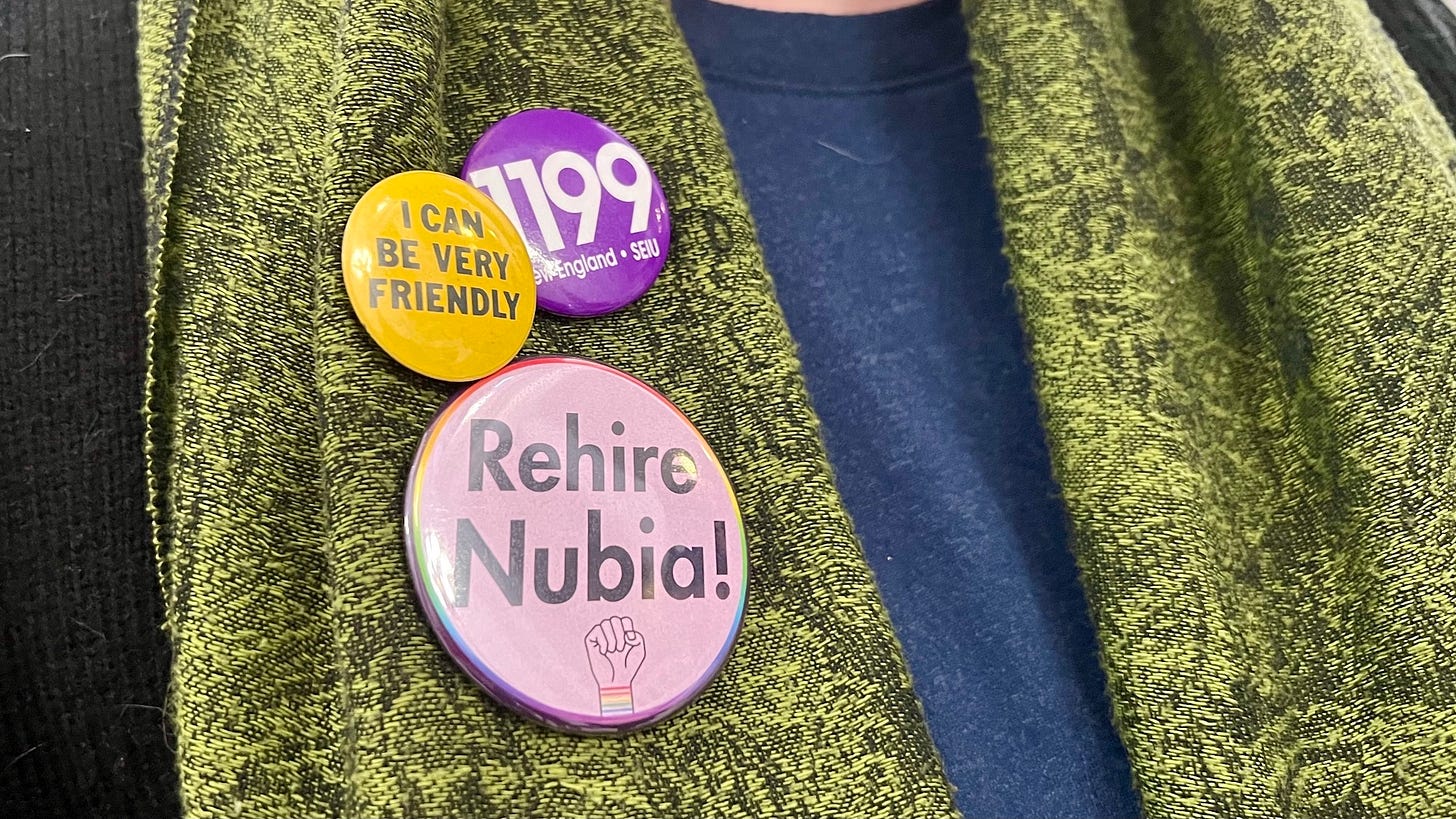
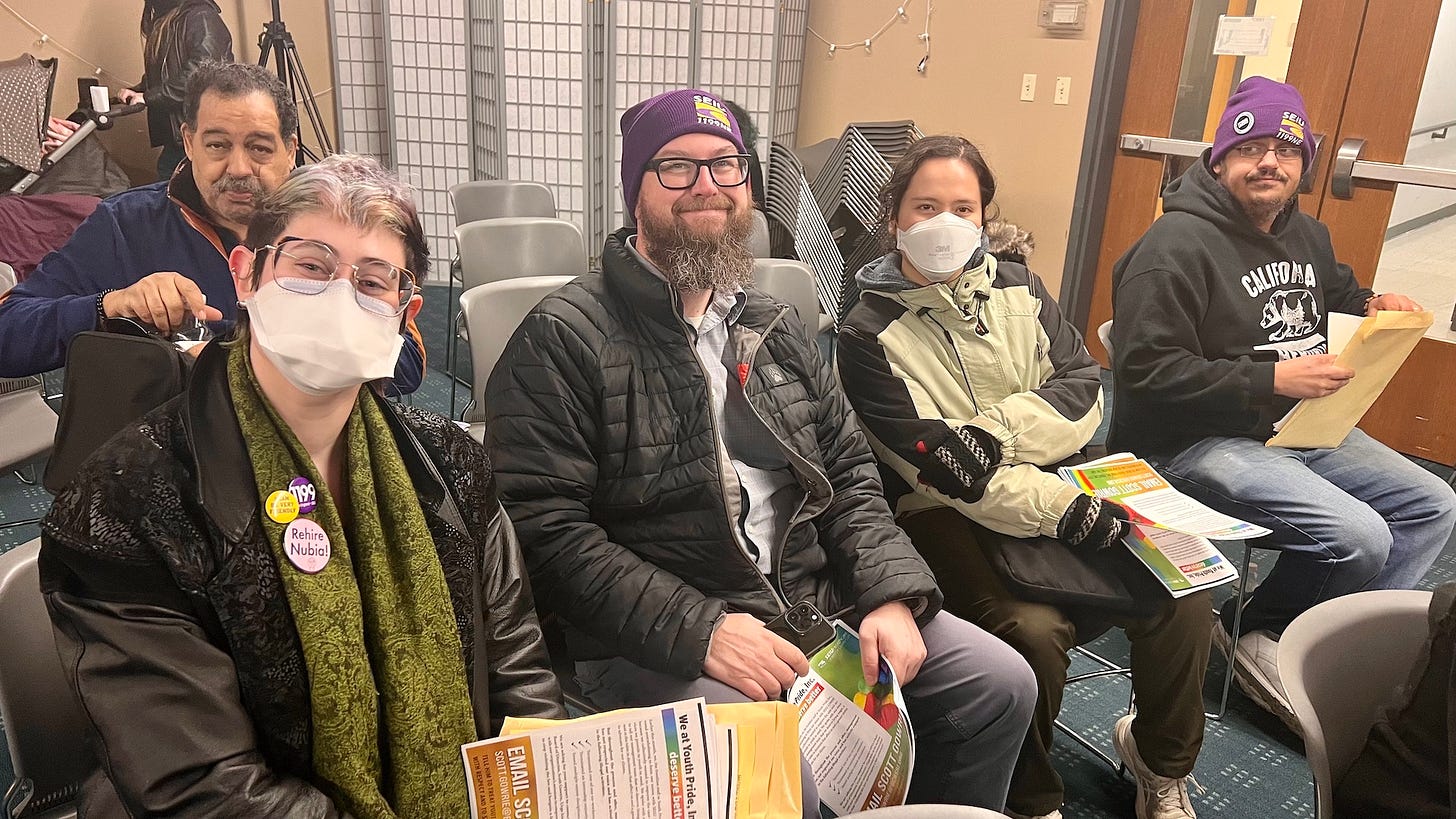
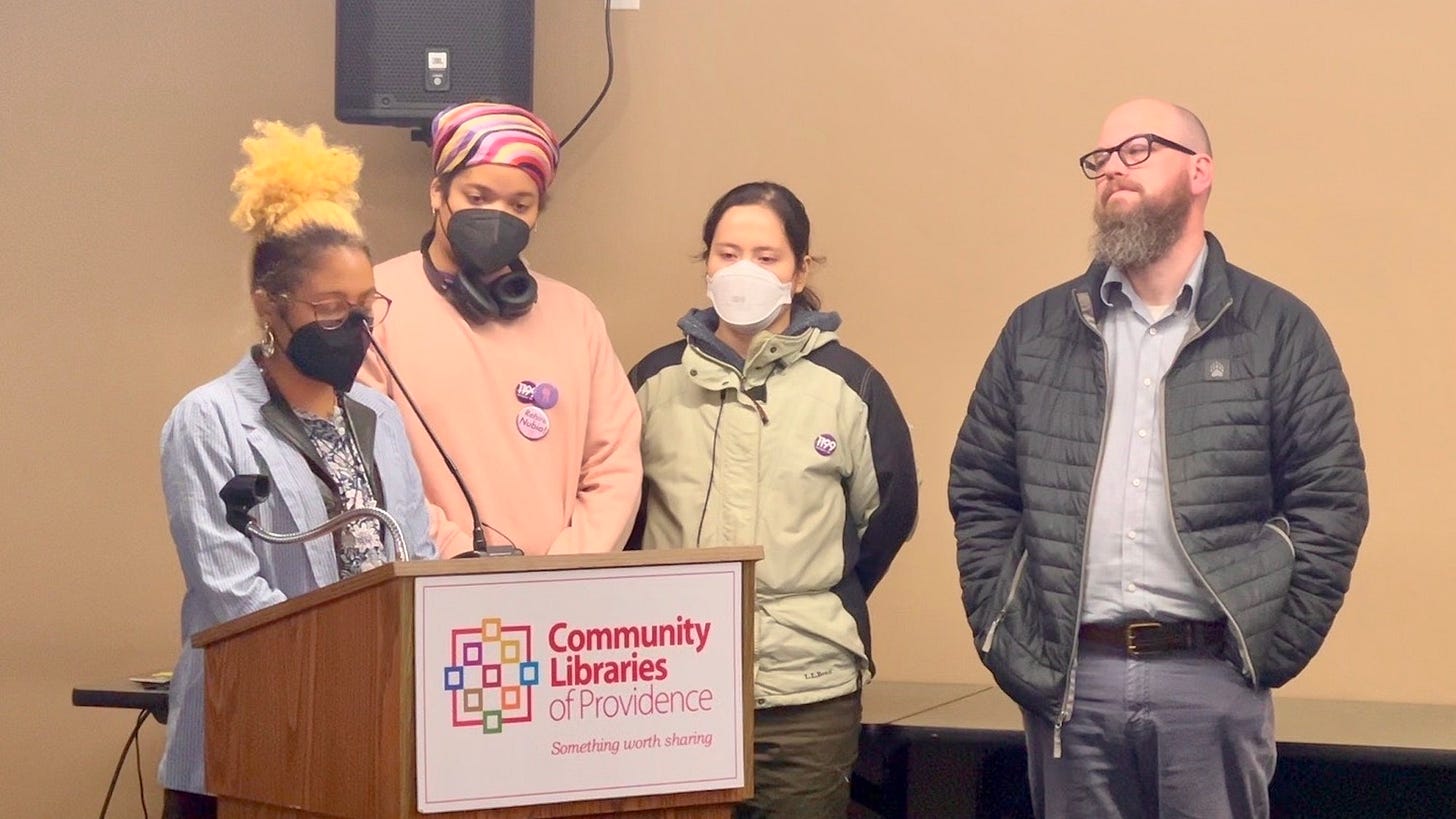
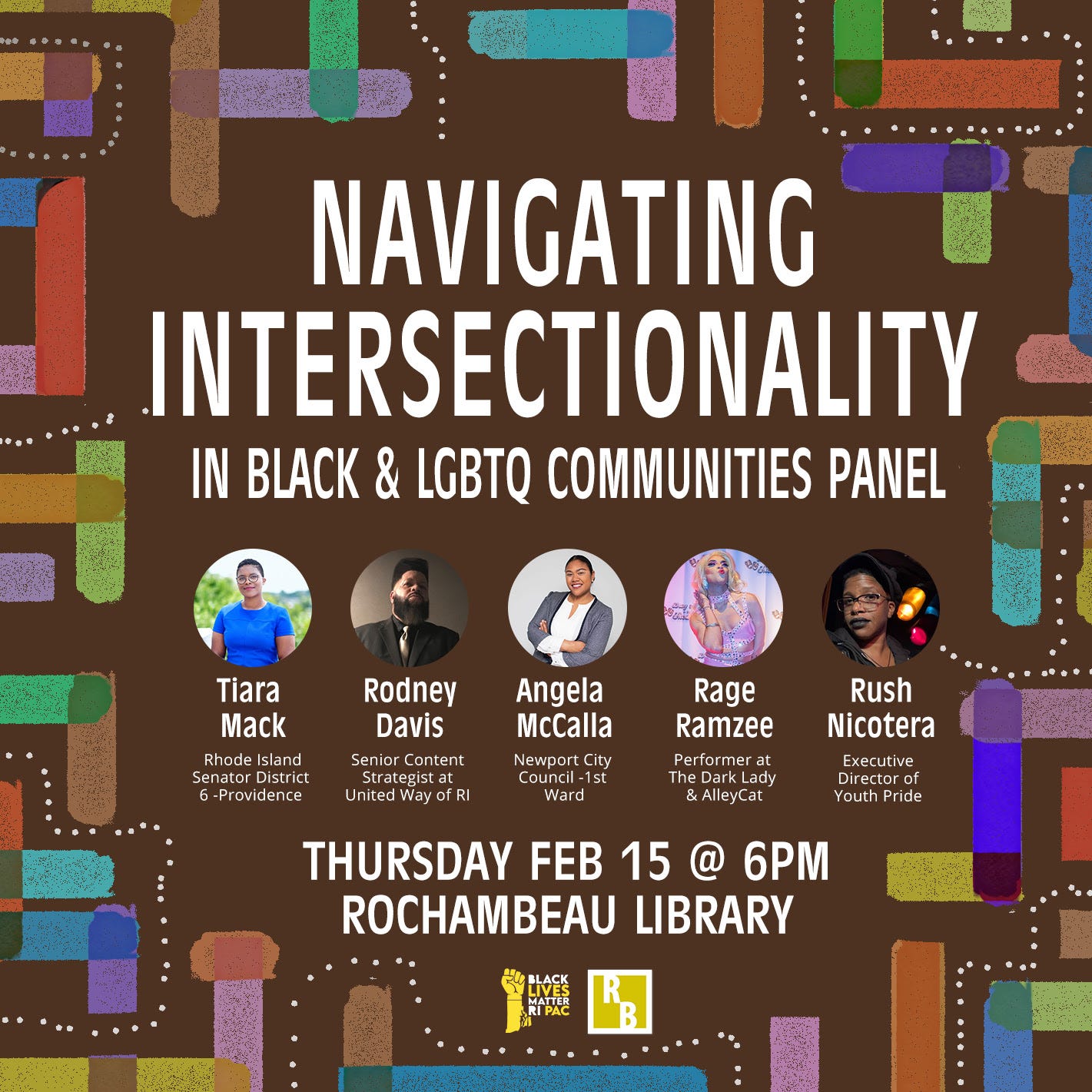
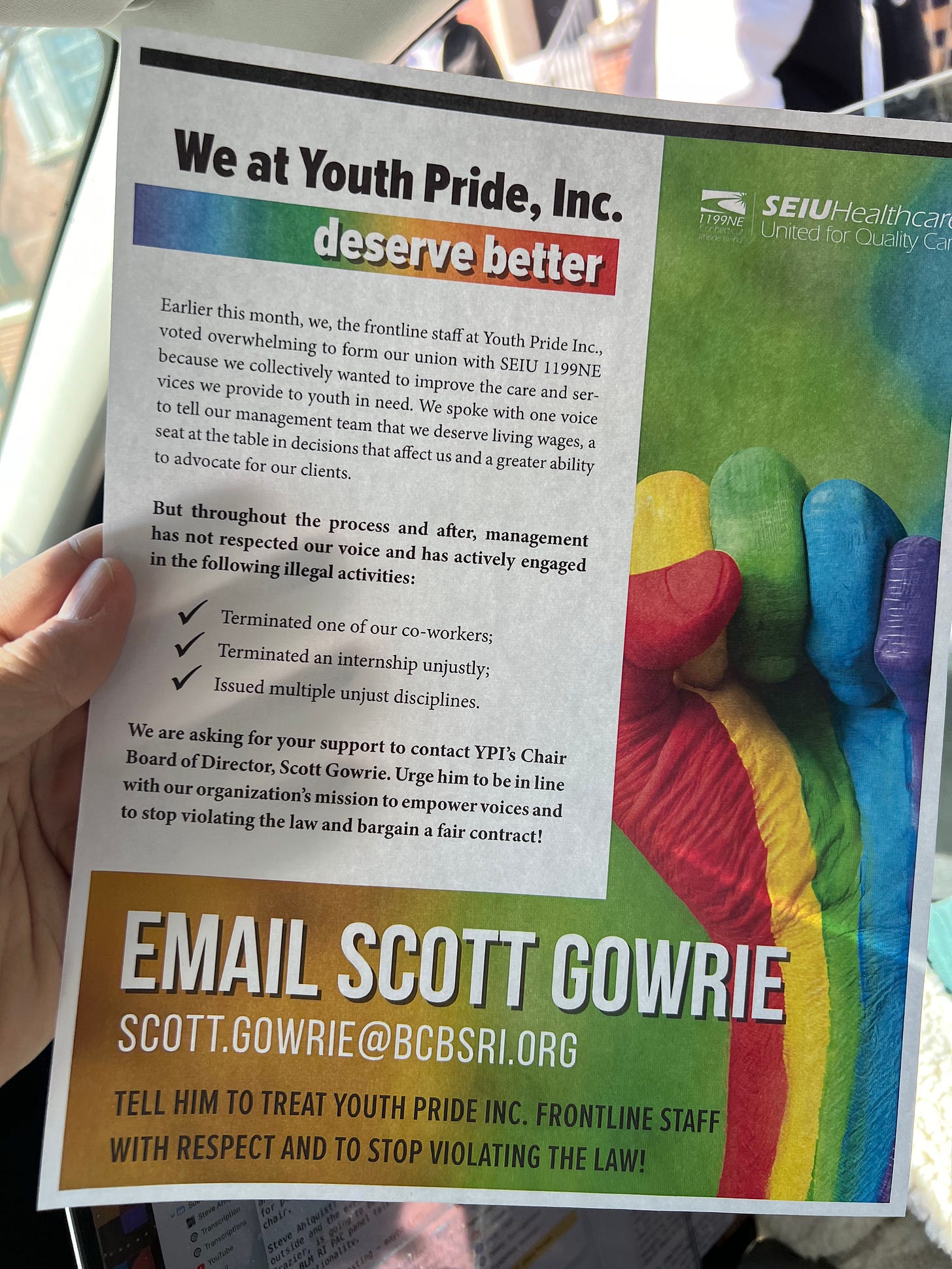
YPI responds on Facebook: [https://www.facebook.com/photo/?fbid=784635583699568&set=a.332431878919943]
Answers To Some Frequently Asked Questions Regarding SEIU 1199 Demands To YPI Management and Board
Q: What is happening?
A: Some Youth Pride, Inc. staff voted to be represented by a union, as is their right. Management agreed to an expedited election and did not try to hinder or sway staff to vote one way or another. We will continue to move forward with our staff and SEIU 1199 in good faith collective bargaining scheduled to start this coming week.
Q: Why does it look like YPI is not responding to the accusations and demands coming from SEIU 1199?
A: The place to address the demands coming from SEIU 1199 is at the bargaining table. We have agreed to meet on the date offered by the union’s leadership and we are prepared to discuss the issues that have been raised publicly at the bargaining table. As far as responding to accusations, SEIU 1199 has raised these accusations at the National Labor Relations Board (NLRB) and we will respond accordingly in that forum as the law requires.
Q: What about the staff and former staff claiming retaliation when they tried to unionize?
A: SEIU 1199 has filed Unjust Labor Practice charges with the NLRB on behalf of the two individuals. YPI maintains that we have not retaliated and will not retaliate against workers for organizing. We will share evidence that defends our position at the appropriate time at the NLRB, while respecting the privacy of the current and former staff making those accusations.
We sincerely thank the community for the outpouring of concern for all parties. We are confident that as we navigate this situation, our community will be stronger for it.
It always amazes me that organizations that should be union friendly hate it when their own staff unionize. Pathetic. And it is not uncommon. Ralph Nader always worked to prevent the staff at non profits he started from unionizing.